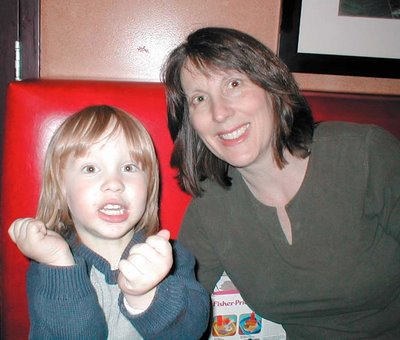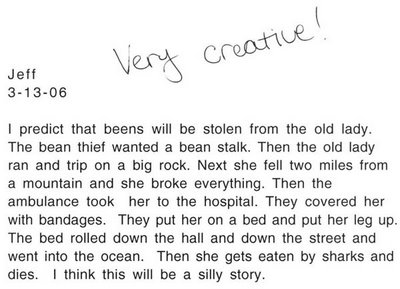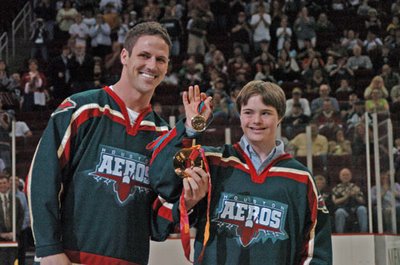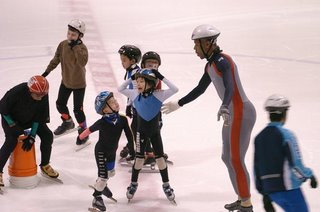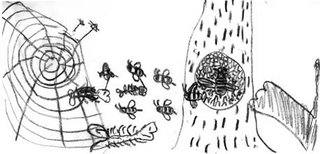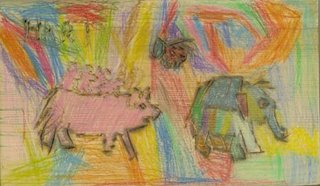June 30, 2006
June 29, 2006
June 27, 2006
Orphanage Care and Language
 Look at this sad photograph. When I came across it, I thought that might be Hart on the right (and maybe Jeff with his back to the camera). That one boy looks so much like Hart. However, Sharron Glennon, who took the photo told me that it was taken at a different Russian "baby house." Our boys were 30 months old at the time we adopted them, so this is the closest I'll ever get to a baby picture.
Look at this sad photograph. When I came across it, I thought that might be Hart on the right (and maybe Jeff with his back to the camera). That one boy looks so much like Hart. However, Sharron Glennon, who took the photo told me that it was taken at a different Russian "baby house." Our boys were 30 months old at the time we adopted them, so this is the closest I'll ever get to a baby picture.
June 26, 2006
Socks

The longer you wear them, the blacker the get
Sometimes, they long for the washer,
But, something inside me says,
DON'T SEND THEM YET!
______________ camp song
I troll the aisles of Big Lots, Gap, Old Navy, Target, Marshalls, The Children's Place. I am on the eternal quest for socks. Socks develop holes, get eaten by the dryer and 12-year-old boys outgrow them after a wearing or two. I am looking for stretchy athletic socks, but THEY MUST NOT BE WHITE. For some reason, both boys hate white socks and will not wear them.
Unbeknownst to them, I do not like white socks either. Nothing says "dork" to me quite like a pair of bright white socks, and nothing says "uber-dork" than white socks worn with blindingly pristine white sneakers. Unless the wearer is playing tennis, baseball or soccer, white socks are, well, dorky.
Clearly we are in the minority, since stores are filled with every size, shape and style of white athletic socks. There are the "no-show" variety, low-cut, crew, calf-high. Grippy soles, ribbed soles, smooth soles. They come plain or with a designer logo of choice. The ones I really hate are those with gray, black or navy soles which excite me until I discover that they are really . . . white.
This is my method. Occasionally, some manufacturer introduces the socks in a different color. They do not sell, so they are marked down. At this point if I find them, I buy lots of them. By the time they get to the discounters like Amazing Savings or Big Lots, I know this is the last chance so I buy all of them, then ask the stock guys to check if there are more in back. In this way, I cornered the market and hoarded all the Hanes black low-cuts, which had been discontinued after a single season. At the moment Nike is producing black athletic socks, but I suspect it will not be for long.
June 25, 2006
Shani Davis and Chad Hedrick (photos)
June 24, 2006
Reunion
I did consider going to the reunion but the logistics of childcare, airfare, car rental, were so daunting. I attended the 20th reunion, when my mom still lived nearby, so it was an excuse to visit her, too. Factoring in a hotel reservation this time . . . I had to ditch the idea.
I guess there are classmates who would not miss it for the world and others who would prefer to poke themselves with sharp sticks than go, but I am ambivalent. The 20th reunion resolved all that: the women looked better, the men looked fatter and balder. The most popular white girl, whose terrorizing only made me worship her more, was a drunken mess. The mean black girls all looked fabulous and had no recollection of me, much less of threatening me and demanding my lunch money. In fairness, the nice black girls also looked fabulous.
This whole wave of nostalgia for a miserable time in my life made me question my grip on reality. I still keep up two friends via email: we three went to elementary school, then junior high and high school together. (They are not going to the 30th reunion, either.) I asked one of them if the whole nightmare had been my own adolescent imagination.
So I am not going to the reunion. My friends both say there isn't anyone in particular they want to see. Maybe that is the interesting thing: it's not the friends with whom I have fallen out of touch, it's the people I have long forgotten or whom I never knew. What are they doing? What are they like?Me: My recollection of that time, particularly in junior high, was that we were menaced all the time. I never used a school bathroom in six years, or carried a purse! Was it paranoia?
Yes, we were chronically menaced. No, it wasn't paranoia. It was a very real and necessary fear. We never used the bathrooms, which if you recall, reeked of reefer. We heard terrible stories of girls getting "jumped" in the bathrooms, usually for money or something. Purses were stolen regularly, so we didn't much use them. Remember Susan having hers ripped from her arm from under the bleachers? She still has the scar from where the handle of her purse dug into her skin. It was heinous. I think we were at a wrestling match or something. Remember earrings ripped from girls' ears? Blood pouring. I get weak just recalling it.
Could we not write a book about those years? I think it would be novel perspective--white girls' experiences at a predominantly black school in the 70s. It was unique, you have to admit. Think of the incredible character we now possess. Weren't our parents mortified by the stories we told? I suspect we left a lot out.
Me: Sometimes I wonder if we were nuts. Y'know, I think the 70s were a horrible time for crime in general and now it's not such an issue. I think I did tell my parents about junior high, but they didn't really care or were too preoccupied. My dad would always say he knew very nice "colored" men at the University of Chicago, and I would be reminded that he did not have a clue. However, my mom insisted they move to a different district after my brother's 7th grade year. Hmmmmm.I think crime is still pretty bad in spots. It seems to be drug-driven now. Back then it was hate-driven. We were white, so we were hated (by some). To help matters, if you recall, "Roots" was aired night after night while we were at school. I swear things escalated during that week and weeks to follow. Pins in the ass as we walked down the hall. Shoving. Head slamming. General taunting and name calling.
Me: At the 20th reunion, Susan nudged me and pointed at Brenda. "Oooooh she was mean." We both remembered B walking over to Susan and putting her a half-nelson and throwing her onto the ground. No provocation. I thought of that yesterday when a really thuggish-looking black guy with a do-rag held the door for me, saying, "Excuse me." It was a conditioned response to want to leap out of his way.
On the other hand, I feel like I got a superior education. I don't think I was shortchanged at all. People ask where I learned to read music, how I know world history, how I can run a sewing machine and when I had a chance to read Shakespeare . . . I learned that all before college.
I have to agree with this. When I break into Chaucer's "Canterbury Tales" using Middle English, people stare in amazement. I'm pretty sure nothing else I've ever uttered has given cause for people to consider me "educated." It tickles me more than anything.
No matter. I'll get the next invitation in ten short years.
June 21, 2006
June 17, 2006
Diagnosis
We do not always recognize each other, but we have a password: diagnosis. "What's your diagnosis?" we might ask another parent. "Do you have a diagnosis?"
For the first few years of our children's lives, a diagnosis is akin to the Holy Grail. "We are still trying to get a diagnosis." "No one has made a diagnosis." Parents, especially those with older children, are the first to notice that something is not right. "She just wasn't hitting the developmental milestones like her big sister," someone says. "I could tell, too," replies another mother, "but the pediatrician has not made a diagnosis." Diagnosis is magic; it vindicates the parents. There is a name for the weird stuff, this absence of normality. It has been identified and studied and written about. It is not the parents' imagination or their fault.
Thais Tepper, the founder of Parent's Network for Post-Institutionalized Children, has said that when she brought her son home in the early 90s, she joked that he had "Romanian Adopted Kid Syndrome." It was later that she found out that his behavior had a name and a Diagnostic and Statistical Manual of Mental Disorders code--Reactive Attachment Disorder, which is typical of children in long-term foster or institutionalized care. These children have not had the opportunity in infancy to bond with an adult caregiver. Thais herself, identified RAD in her son after reading about it.
Diagnosis is a fair weather friend. Around school age, it becomes fickle. In order for your child to qualify for special education, you need a diagnosis. Too severe and your kid might serve an 10-year sentence in a very restricted class with minimal expectations. Too gentle and she's destined to struggle in a regular classroom, maybe with a bit of extra help like speech/language therapy or "pull-out time" for reading. If your child has ADD or an anxiety disorder, for instance, but it does not represent a learning impairment, or if your child is just not too bright, get ready, your kid does not qualify for any services! Unlike Lake Wobegon, where all the children are above average, school district administrators know that some kids have to be on the left side of the bell curve. Which is fine, unless it happens to be your child.
The line between MMI or MR (mild mental impairment) and LD (learning disability) may be extremely fine, but having one or the other sends the child down completely different paths. "We want a new diagnosis," a father says "We agreed that he was MMI when he was in second grade, but now he could function in a regular classroom. His therapist thinks his diagnosis should be LD."
If only a diagnosis was straightforward, but few of these kids actually look like the textbook case. No one exactly matches the DSM description. Many of these children appear ADDish or have wild mood swings. It could be ADHD or bi-polar disorder or depression or just moodiness.
Professionals talk about "autism spectrum," but is the spectrum a straight line or a Venn diagram? Does a child on the spectrum appear high-functioning or low-functioning somewhere on a right-to-left line, or in a pattern of maladaptive dots?
My own non-scientific method is to ask if a diagnosis is a "hardware" or "software" problem. A hardware problem, such as retardation or autism, refers to the limitations of the machine. A software problem, LD or attachment disorder, could be fixed, right? Upgrade the disk. Find a new program.
You might notice us out in public. It is permissible to introduce yourself by asking politely what my child's diagnosis is, or if I'd care to disclose it. "What is wrong with that kid?" marks you as an outsider.
June 16, 2006
Camp
Hart is going to overnight camp the first time. Some kids go to sports camp, some to music camp or science camp: Hart is going to social skills camp. I was thrilled to hear about this new program:
"a week-long, overnight summer camp experience for boys and girls who have been diagnosed with Asperger's Syndrome, Non-Verbal Learning Disorder, Learning Disabilities, ADD, ADHD, High Functioning Autism, or related disorders that have a significant impact on social skills development."Overnight camp is the ultimate social experiment for children. They fly away, lose all their belongings, try a bit of independence, then come home. Unlike the progressive Jewish-Zionist camp that I attended and loved as a kid, this week for Hart looks to be more of a controlled social experiment.
"The Camp provides a unique camp experience designed to foster friendships and positive social interactions among campers in a supportive, safe, and structured atmosphere."
Hart is apprehensively looking forward to his week away, but me, I am ecstatic.

June 15, 2006
June 14, 2006
June 13, 2006
June 10, 2006
Talk
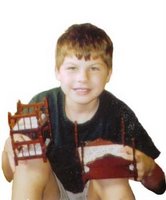 Jeff needs a medication tune-up badly. He is driving me nuts. This is his break between school and summer session. I have been home with him for one week and his appointment with the doctor is still a few days away.
Jeff needs a medication tune-up badly. He is driving me nuts. This is his break between school and summer session. I have been home with him for one week and his appointment with the doctor is still a few days away. Jeff chatters non-stop. He can't stop talking. He says the same nonsense phrases over and over, and even if he is actually having a conversation, he'll repeat himself five, ten times. If he's alone, he'll hum or smack his lips loudly. Sometimes he'll just "chant" some bit of dialogue, like Dustin Hoffman did in Rain Man. He can't help it. I want to strangle him.
The conventional wisdom is that if you ignore undesirable behavior it will go away, but I know for a fact this is not the case. Jeff's mouth needs to be moving every waking minute.
His therapist told him yesterday, "Your brain needs to be busy." I know a few tricks . . . word games, "brain-mapping," distractions. But after a week of this, I just want to scream "GIVE YOUR MOUTH A REST," or throw myself out a window.
It is a strange irony, given how long it took for the boys to start talking. I have video of them at age three and a half. They aren't speaking at all. At age four, Jeff was beginning to make one and two word utterances, like most 24-month-olds. Now, at age twelve, I long for him to just shut up . . . just for ten minutes or so.
Reach out . . .
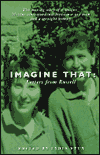 Can it be twenty-five years since the first case of AIDS? It is hard to believe. Any discussion of human catastrophe in my lifetime makes me feel like I have a boulder sitting in my stomach. The thought of AIDS or HIV gives me a persistent dull ache in my chest. From 1983 to 1995, twelve friends of mine, young gay men in their 20s and 30s, succumbed to the disease. It's not much compared to the entire communities of friends decimated and it is nothing compared to the grief of the partners and the families they left behind. But it is grief, my own personal pain, and every time I think of one of those guys, I feel a lump in my throat.
Can it be twenty-five years since the first case of AIDS? It is hard to believe. Any discussion of human catastrophe in my lifetime makes me feel like I have a boulder sitting in my stomach. The thought of AIDS or HIV gives me a persistent dull ache in my chest. From 1983 to 1995, twelve friends of mine, young gay men in their 20s and 30s, succumbed to the disease. It's not much compared to the entire communities of friends decimated and it is nothing compared to the grief of the partners and the families they left behind. But it is grief, my own personal pain, and every time I think of one of those guys, I feel a lump in my throat.That era was before email and the internet, so I phoned or wrote these friends. Some had moved to the west coast or east coast or stayed in Ohio. Some died early and alone in what seemed then like some freakish medical anomaly. In 1982, Brian Loree visited me in my grubby first Chicago apartment right before he started graduate school. He lost 40 lbs in the next few months and then died of pneumonia. Pneumonia? Others died surrounded by friends, family and community, in hospice or at home. I didn't know it at the time, but Rusty Gorham was making his last rounds visiting friends around the country. So disfigured was he by Kaposi's Sarcoma that our waiter--in a Halsted Street restaurant--dropped the tray of water on us in surprise.
At the end of 1992 Queen Elizabeth made a speech about her "annus horribilus." Her son was a tabloid joke and her castle sustained a fire. Young men were dying by the thousands, including three classmates of mine, all close friends, who died in as many months. What did her Maj know about a bad year?
I had late night urges to go through my address book (remember those?) and call up to say, "Please assure me that you are still alive. Are you OK?" But I didn't. I continued to phone occasionally, visit when I was in town or write letters (remember those?) Was I a good enough friend? Was I brave and cheerful in the face of such tragedy? Who knows.
This 25th anniversary came simultaneously with some other news of past friends. Two straight men from my past are suddenly newsworthy. One was recently featured in a New York Times Magazine article about his community activism and the other is an award-winning documentary filmmaker. I would love to email or call and say hello and congratulations. But I can't.
If I heard from some long-lost friend in that way, how would I feel? Delighted, charmed, skeptical, suspicious? It hasn't happened to me and I have a very unusual last name. Anyone with computer access could have my address, phone number and email address in two seconds. But no one has contacted me. Do any of my classmates, bunkmates, old neighbors, boyfriends ever wonder what I am doing?
The premature deaths of my friends put them out of contact with me forever. We might have eventually grown apart anyway, as people do, but that does not diminish the relationship we had. What about those long-ago friends who are still alive? Is there a statute of limitations on hearing from old friends?
At the very end of his life, my friend Russ Harold had dementia and no functioning liver. He received a blood transfusion every evening, so he was lucid for a while thereafter. If he was up to it, he took my phone calls. One night I said, "I will miss you so much. I'll miss your letters and I won't be able to talk to you anymore." "Yes, you will," he said."You can always talk to me."
Imagine That: Letters from Russell
OUTLINES excerpt, 1997
The Names Project: AIDS Memorial Quilt
Immune Enhancement Project
June 3, 2006
Cryptic References for $200, Alex
Me: Huh? Place with bras? A store?
H: No, a place, a city . . .
Me: Hmmmmm.
H: . . . where they dance!
Me: A city. Las Vegas?
H: YES!
May 31, 2006
June 2, 2006
Little Deuce Coupe
 I feel the same way about cars as I do about dogs: very nice . . . for other people. I have just never had an interest in either. I like my pets and my cars to be practical and low-maintenance; e.g. cats and Hondas. Then I fell in love.
I feel the same way about cars as I do about dogs: very nice . . . for other people. I have just never had an interest in either. I like my pets and my cars to be practical and low-maintenance; e.g. cats and Hondas. Then I fell in love. Every year I dutifully take the boys to the Chicago Auto Show. Auto Show 2001! A coming attraction: next season BMW is to reintroduce that icon of London's Carnaby Street swinging 60s, the Austin Mini. There were a number of prototypes around the booth. I was smitten.
The Mini Cooper is not what one might call a practical family car. Namely, it is small, albeit beautifully designed. There are four seatbelts: no carpooling! The backseat is spacious enough for a car only 12' long, but the hatch could hold a bag or two of groceries or one backpack. Out of the question.
Two years later, I did something completely out of character. Hardly an impulse purchase, but still ridiculous and contrary to my nature, I threw away a perfectly good two-year-old Honda Accord and bought a Mini Cooper. Silver, with a black top and black “bonnet” stripes.
Frivolous yes, but that car has given me pleasure every single day that I have had it. It even has a name--Trooper. On the Mini owners’ website, most of the cars have twee British first names, Nigel, Clive, Trevor or clever plays-on-words, Mini Me, Mini Mouse, Mini Mum. A vanity license plate would be too much, but I do have an idea for one: Minnie Driver. Hee hee hee.
In case you wondered, a Mini is way too small to accommodate a dog, even a very small one.
 Trooper and our unamed Honda
Trooper and our unamed Honda